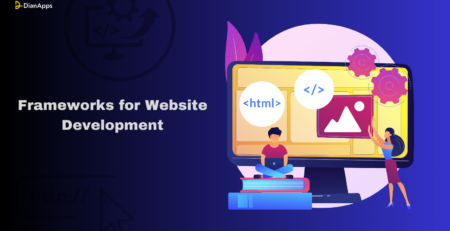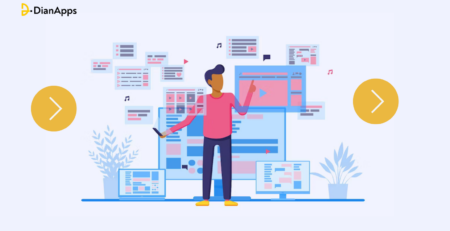The Impact of Artificial Intelligence (AI) on Website Development
AI or Artificial Intelligence has become an eye candy for businesses across the globe. The growing popularity of AI has forced digital transformation to change the aspects of businesses and create smarter, more responsive, and customized business apps as per the user’s demand.
Such changes around the technology world also brought attention to the website development industry. As of 2023, 73% of website development companies installed AI in their web development services because they thought it was going to be massive in the future.
But how AI can be used in website development? How will it impact on website development?
From planning to designing, AI can play an important role in building a website. It may also help you analyze human behavior at a great level with a summary to create more user-friendly websites that match any visitor’s mindset and also provide exclusive interfaces.
In this blog post, we are going to address pointers valid to the impact of AI in the website development process by mentioning a few trends and use cases along the way.
What is AI?
Artificial intelligence, or AI, is a machine version of human intelligence that has been trained to carry out activities that normally call for thinking like a human. AI gives robots the ability to recognize voice, images, and patterns; it also allows them to adapt to new inputs and learn from data.
There are various varieties of AI, such as:
- AI-based on rules: Systems that employ if-then clauses to decide according to a predetermined set of rules.
- Machine learning refers to the ability of systems to learn from data and use that data to forecast or make judgments.
- Neural networks are used in deep learning, a kind of machine learning, to extract knowledge from massive volumes of data.
- Artificial intelligence (AI) systems with natural language processing capabilities.
AI supports many different app development services. comprising natural language processing, speech recognition, picture and pattern recognition, and decision-making. Artificial Intelligence is expanding and changing quickly. Additionally, a lot of research is being done in this field to enhance the prospective uses and capabilities of AI systems.
Current Website Development Scenario
The following important trends define the state of website development at the moment:
Responsive Design:
As more people visit websites using mobile devices, responsive design is becoming a must for website creation. For websites to offer a consistent user experience, they must be made to function on a range of screens, sizes, and orientations.
Progressive Online Apps (PWAs):
PWAs are the latest trend of online applications that give consumers an experience similar to that of mobile apps. They are made to load fast, function offline, and offer a flawless user experience. PWAs are gaining traction as a substitute for native mobile apps.
Voice Search Optimization:
Due to the growing ubiquity of virtual assistants like Siri and Alexa, web developers are concentrating on making their websites voice search-friendly. This involves supplying structured data that voice assistants may utilize to deliver more relevant search results and optimizing content for natural language inquiries.
A Greater Focus on Speed and Performance:
Due to the detrimental effects that slow-loading websites may have on both user experience and search engine results, website developers are placing a greater emphasis on speed and performance. To increase the speed and functionality of websites, strategies including minification, lazy loading, and image optimization are being employed.
Security:
Developers are taking action to make sure websites are safe and protect user data as website security becomes more and more critical. To guard against hacking and other security risks, this entails utilizing HTTPS encryption, putting safe login processes in place, and deploying firewalls and other security measures.
Overall, the present state of website creation is concentrated on making sure that websites are quick, safe, and search engine optimized, all the while offering a top-notch user experience across a range of devices. However, how will AI affect the creation of websites? Let’s investigate.
Web development is currently being impacted by AI in several ways, and these effects are only anticipated to increase in the future. The following are some significant ways AI will affect web development:
Automated Design:
AI uses user behavior and preference analysis to automatically create website layouts and designs. This can enhance the user experience overall and save developers time and effort.
Content Creation:
By evaluating user data and producing individualized content that appeals to the audience, AI-powered technologies may produce content automatically.
Personalization:
AI may increase engagement and conversion rates by delivering information, offers, and ideas that are uniquely personalized to each user based on an analysis of their user data.
Enhanced User Experience:
AI aids in streamlining load times, increasing website speed, and enhancing user experience in general. AI algorithms, for instance, may be used to automatically change the parameters for picture compression. This leads to quicker load times without compromising the quality of the images.
Enhanced Security:
By applying machine learning algorithms to recognize trends and abnormalities in user behavior and network activity, artificial intelligence (AI) may be used to detect and stop security risks like malware, DDoS assaults, and hacking.
In general, it is anticipated that the application of AI to web development would save developers time and effort while also greatly enhancing website security, performance, and user experience. We may anticipate even more cutting-edge uses of AI in web development in the future as the technology develops.
What AI applications are being used for web development right now?
AI is now being used in web development in a number of ways, such as:
- Chatbots: AI-driven chatbots are deployed on websites to offer round-the-clock customer service and support. It also lessens the strain on customer support workers and enhances the user experience. See also: What does chatGPT, an AI tool, signify for writing in the future?
- Personalization: AI is capable of analyzing user behavior and data to deliver tailored content. Additionally, suggestions to users, improving user engagement and conversion rates.
- Voice Search Optimization: AI aids in the optimization of websites for voice search by supplying structured data that voice assistants may utilize to deliver more effective search results and optimizing content for natural language queries.
- AI algorithms assist in the identification and labeling of photos and movies. simplifying the process of finding and organizing media materials.
- Website Design: AI is being used to automatically generate designs and layouts for websites. Through the examination of user behavior and preferences, time and effort may be saved for developers, and the entire user experience can be enhanced.
- Performance Optimization: website performance works authentically by analyzing user data and behavior. Also identifying opportunities for improvement and making automatic adjustments to website elements, such as image optimization, and compression.
Moreover, the current applications of AI in any best website development company are focused on improving the user experience, website performance, and security, while also saving developers time and reducing costs. As AI technology continues to evolve, we can expect to see even more innovative applications of AI in web development in the future.
Top considerations and challenges for implementing AI in website development
While AI has many benefits for web development. When planning to implement AI in web development, there are also several challenges and considerations:
Data Quality:
AI relies on high-quality data to provide accurate insights and recommendations. Without high-quality data, the results from AI algorithms can be inaccurate or misleading. It’s essential to ensure that the data used to train AI models is accurate, relevant, and up-to-date.
Privacy and Security:
Collecting and using user data for AI algorithms can raise concerns about privacy and security. It’s essential to ensure that data is collected and used in a responsible and ethical manner. And that appropriate measures are in place to protect user data from theft, loss, or misuse.
Implementation Costs:
Implementing AI in web development can be costly. Both in terms of the technology itself and the resources needed to develop and maintain it. It’s essential to carefully consider the costs and benefits of implementing AI and to ensure that the investment is justified.
User Acceptance:
Some users may be hesitant to use websites that incorporate AI, either due to concerns about privacy. Or simply because they prefer a more traditional user experience. It’s essential to ensure that users are educated about the benefits of AI. The user experience is designed to be intuitive and user-friendly.
Integration with Existing Systems:
Implementing AI in web development may require significant changes to existing systems. Such as content management systems or e-commerce platforms. It’s essential to ensure that AI integrates seamlessly with existing systems. And that any necessary modifications are made to ensure compatibility.
Implementing AI in web development requires careful consideration and planning to ensure the benefits of AI. In order to maximize the potential challenges. It is essential to ensure that the data of the trained AI models is accurate and that user privacy and security are protected. And that the user experience is designed to be intuitive and user-friendly. With careful planning and implementation, AI can significantly improve the user experience, website performance, and security. While also reducing costs and saving time for developers.
Wrapping Up
In conclusion, the impact of artificial intelligence (AI) on website development is significant. We can expect to see even more innovative applications of AI in the future. AI can enhance the user experience, website performance, and security, while also reducing costs and saving time for developers. AI uses personalizing the user experience, optimizing website performance, creating content automatically, and providing 24/7 customer support and assistance.
However, implementing AI in web development also presents challenges. For instance, data quality, privacy, implementation costs, user acceptance, and integration with existing systems.
As AI technology is changing the world around you, we can expect even more applications of AI in web development. For instance, voice search optimization, image and video recognition, and automated website design. AI has the potential to revolutionize web development, providing users with personalized and intuitive experiences. While also making web development more efficient and cost-effective.
Reach out to us for all your website app development needs and we will help you derive the best possible using top-class AI tools that will surely create a big impact on your business.




